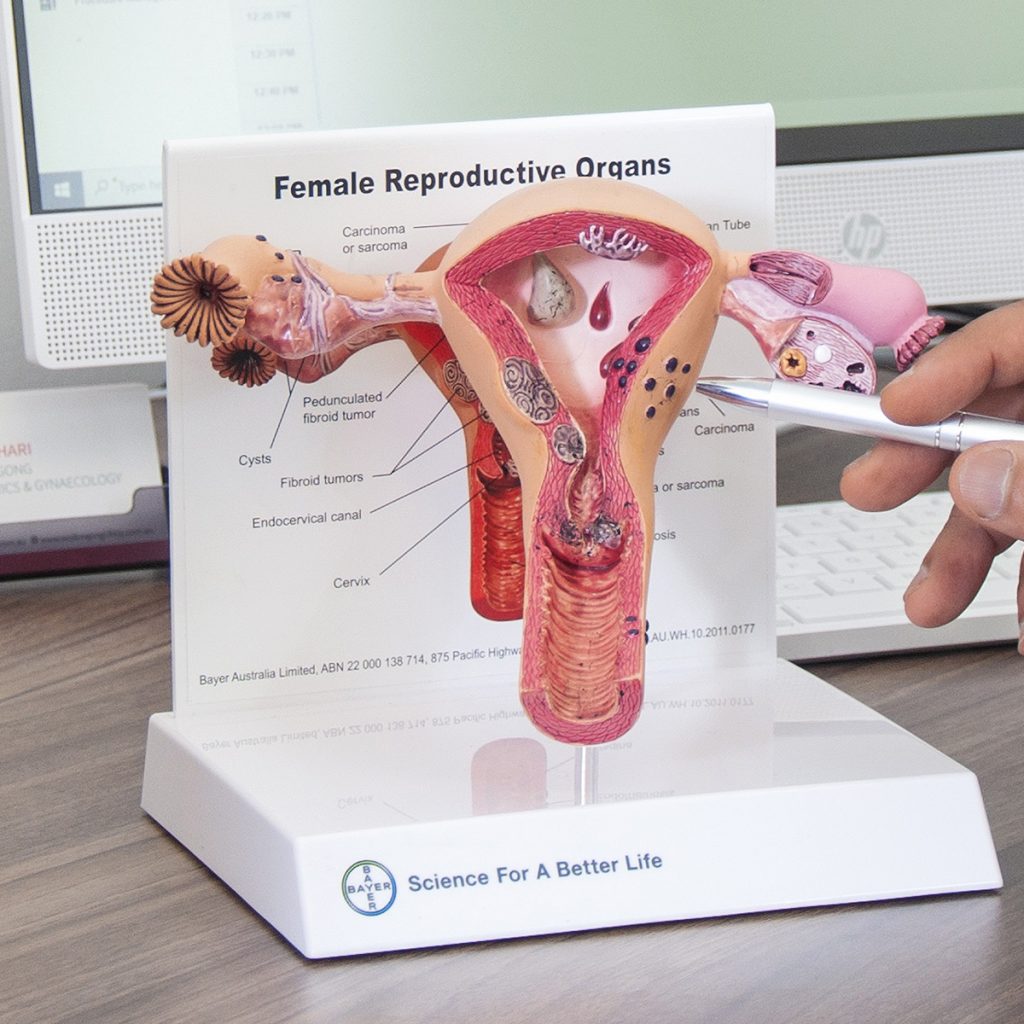Endometriosis
What is endometriosis?
Endometriosis is a common disease where the tissue that normally lines the uterus (womb) grows outside this layer and occasionally to other parts of the body. One in 10 Australian women suffer from endometriosis during their life, commonly known for causing chronic pelvic pain, abnormal periods, and/or infertility. This disease can be found in women of different ages but often starts in teenage years.
Whilst endometriosis most often affects the reproductive organs it has also been found in the bowel and bladder, and occasionally in muscles, joints, the lungs and the brain. There is currently no cure for endometriosis, but there are a number of treatment options to help.


What are the common symptoms?
As all women are unique, the range and severity of symptoms vary from person to person. It is estimated that 75% of women with endometriosis suffer from chronic pain. This usually occurs during a woman’s period but has also been found when passing urine or making bowel motion, and during sexual intercourse.
The most common symptoms include:
- Fatigue
- Severe pain during or around your period
- Pain during or around ovulation
- Pain during or after sex
- Pain with bowel movements
- Pain when urinating
- Pain in your pelvic region, lower back or legs
- Having trouble controlling a full bladder
- Heavy or irregular bleeding
If you suffer from these symptoms or suspect you may have endometriosis, it is important to seek medical attention as early as possible to help minimise further complications. Dr Kothari is highly experienced and has taken appropriate training to properly assess and diagnose women experiencing symptoms of endometriosis.
How is the diagnosis made?
With varying symptoms between women, a proper diagnosis of endometriosis can sometimes be delayed for up to 10 years. The only way to correctly diagnose endometriosis is through laparoscopic (key-hole) surgery, where a tissue sample is taken for further tests.
Dr Kothari performs the laparoscopy on his patients under a general anaesthetic, where small incisions are made on the skin and a tiny camera is inserted. This technique allows Dr Kothari to properly assess the internal area of your abdomen and organs of the pelvis. Magnifying the tissues can help locate traces of endometriosis, which are then removed and sent to a pathologist to confirm the diagnosis.
What is the treatment for endometriosis?
There are three types of treatments available for endometriosis, and will depend on where the endometriosis is located and how much is found:
- Medical treatments – including hormonal and non-hormonal medications to manage on-going pain
- Surgical treatments – involving a laparoscopic or robotic operation to remove remaining endometriosis tissue. Please click the video below to watch endometriosis excision through Da Vinci robot performed by Dr Kothari.
- Allied treatments – alternative medicines and treatments such as physiotherapy and psychology
Before moving ahead with treatment, Dr Kothari will first discuss what options are available for you, depending on your personal condition. He will advise on the possible side effects or complications that may arise and outline any advantages and disadvantages to all types of treatments. As there is currently no cure for endometriosis, it is important to find the most appropriate treatment that will help relieve any pain or symptoms of this disease.
Are there any risks of treatment?
Depending on your treatment plan and your individual body, there may be some risks associated with different treatments and procedures.
It is not uncommon for medical treatments such as hormonal or non-hormonal medications to pose certain side effects. These can include spot bleeding, break-through bleeding, bloating, weight gain, nausea, skin breakouts, changes in blood pressure and depression.
When performing surgery in the abdomen, there is a risk of damaging other organs such as the bladder, bowel, uretes, or large blood vessels in the area being operated in. In this case, further surgery may be needed for immediate repair of any damage or may require extensive surgery at a later time.
There are minimal risks associated with allied health plans such as alternative medicines and treatments. Seeing a psychologist or physiotherapist has no known health complications, but patients should be aware of the occasional side effects of acupuncture, herbalism and other complementary medicines.
Our patients should feel confident in knowing Dr Kothari will discuss any risks associated with any treatments or procedures prior to commencement and that he is highly experienced in the surgical management of endometriosis.
DOWNLOAD ENDOMETRIOSIS FACT SHEET
